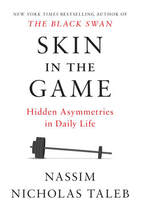
I'm a huge fan of Nassim Nicholas Taleb's work and thinking.
My favorite (most mind-altering) book from a few years ago was Antifragile. I also enjoyed his book of aphorisms, The Bed of Procrustes. Where Antifragile leaves off, there begins Skin in the Game: Hidden Asymmetries in Daily Life by Nassim Nicholas Taleb. I found that this last book builds on and combines a lot of the lessons in Fooled by Randomness, Black Swan, and Antifragile. It was really good. I also felt in many ways personally humbled and called out because I have, in the past and certainly in some ways in the present, fallen into the traps of scientism, IYI-ness, brain porn, etc. -- all the ways that our thinking can go wrong when not driven by skin in the game and survival-focused rationality. The concept of ergodicity was the toughest to grasp, and I felt like it could have been explained more clearly and in more depth with more examples, but after doing some careful re-reading, I think I got the essence of it. It presents a very useful lesson for thinking about real-world decisions and which class of probabilities the risks fall in: ergodic (not subject to absorbing barriers of ruin) or non-ergodic (subject to scenarios of total ruin, where traditional cost-benefit analysis and simple [academic] "probabilistic reasoning" doesn't make sense). It's so easy to forget this and keep going along doing the same type of pseudo-rational thinking that was drilled in us in college in "decision theory" classes. I like the counterbalance in his writing between intense technical rigor (see the technical appendix filled with formulas and proofs) and street smart "tawk" (calling on the wisdom of grandmothers and the ancients to point out what obviously makes sense in some situations rather than what "scientism" can delude us into believing [GMOs, etc.]). I wasn't a big fan of all the political name bashing and calling out of Monsanto shills, Hillary Monsanto Malmaison, and other such things, but I do get that this is part of the system of virtue where he cares a lot about calling out frauds by their true name and not caring what others think. There were a lot of valuable and practical lessons in the book, and some of my main takeaways are here:
I keep wondering how I can keep these fresh in my mind going forward and keep applying these to make tangible changes in my life (especially via negativa-wise) and become less of an IYI over time. Other (somewhat unresolved) questions this book has prompted me to think about:
My full notes on the book span 35 pages, but a collection of the points that were most relevant for me is below.
0 Comments
Your comment will be posted after it is approved.
Leave a Reply. |
Archives
June 2024
Categories
All
Subscribe |
 RSS Feed
RSS Feed
